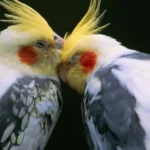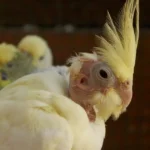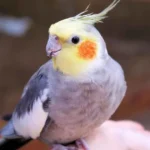Cockatiels are charming, small parrots with a distinctive crest and bright personality. They are native to Australia and thrive in captivity with proper care. Known for their sociability, these birds often form strong bonds with their owners.
Can Cockatiels Eat Peanut Butter? This question captures the curiosity of many cockatiel owners. It’s crucial to know what’s safe for these feathered friends to munch on. After all, their health and happiness depend on it.
A cockatiel’s diet should be varied and nutritious. It typically includes pellets, seeds, fruits, and vegetables. While treats can be given, they must be suitable and healthy for the bird. Knowing the right foods is key to a cockatiel’s well-being.
Is peanut butter healthy for Cockatiels?
Peanut butter can be a treat for cockatiels but should be given in moderation. Organic peanut butter is safe but high in calories and fat. Processed varieties are not recommended due to additives and emulsifiers. Always offer small quantities to prevent health issues.
While peanut butter is not toxic, it’s not a healthy diet option for cockatiels. It’s rich in protein but can lead to obesity if overfed. Ensure a balanced diet for your cockatiel and use peanut butter only as an occasional treat.
Cockatiel Dietary Restrictions And Peanut Butter
Cockatiels can enjoy peanut butter, but moderation is key. Natural peanut butter without additives is the safest choice for these birds. It’s a good protein source, yet it’s high in fat, which can be unhealthy in large amounts. Limit peanut butter to less than 5% of a cockatiel’s diet to avoid health issues.
Processed peanut butter is not safe for cockatiels due to potentially harmful ingredients. Always check for added sugars, salt, and preservatives, which are not suitable for cockatiels. Instead, offer occasional treats of natural peanut butter and consult a vet for personalized dietary advice.
Relative Post: Can Cockatiels Eat Grapes?
Nutritional Analysis of Peanut Butter For Cockatiels
Peanut butter provides protein and healthy fats beneficial for cockatiels in small amounts. It’s rich in vitamin E, supporting the immune system and healthy feathers. However, it’s calorie-dense and can lead to obesity if not carefully moderated. Offer sparingly to maintain a balanced diet for your cockatiel.
Organic peanut butter without additives is the safest option for cockatiels. Processed peanut butter with emulsifiers and additives should be avoided. Monitor your cockatiel’s water intake as peanut butter can cause thirst. Use it as a rare treat to complement a varied diet.
| Component | Amount per 100g | Benefits | Risks | Recommended Serving |
| Protein | 25g | Muscle health | Obesity if overfed | Sparingly |
| Fat | 50g | Energy source | Weight gain if overfed | Sparingly |
| Vitamin E | 9mg | Immune system and feather health | None | Sparingly |
| Calories | 588kcal | High energy treat | Obesity if overfed | Sparingly |
Potential Health Risks of Peanut Butter For Cockatiels
Peanut butter is high in fats, posing obesity risks for cockatiels if overfed. Processed varieties with additives can lead to dehydration and other health issues. It’s sticky, which may cause excessive thirst and impact the bird’s hydration. Allergies to peanut butter, though rare, can also occur.
Excessive peanut butter can displace healthier foods, causing nutrient deficiencies in cockatiels. The high calorie content can contribute to weight gain, a serious health concern. It’s crucial to monitor your cockatiel’s diet and limit peanut butter to occasional, small treats to avoid these risks.
Safe Peanut Butter Consumption For Cockatiels
Cockatiels can enjoy organic peanut butter as a rare treat in tiny amounts. It’s essential to avoid processed peanut butter due to harmful additives. The treat should not replace their regular, nutritious diet. Always provide fresh water as peanut butter can increase thirst.
For safe consumption, only offer a small dab of peanut butter on a fruit slice or vegetable. Monitor your cockatiel’s reaction and intake to prevent overconsumption. Stick to natural, unsalted, and unsweetened varieties. Limit this treat to maintain your cockatiel’s overall health.
Cockatiel-Friendly Alternatives to Peanut Butter
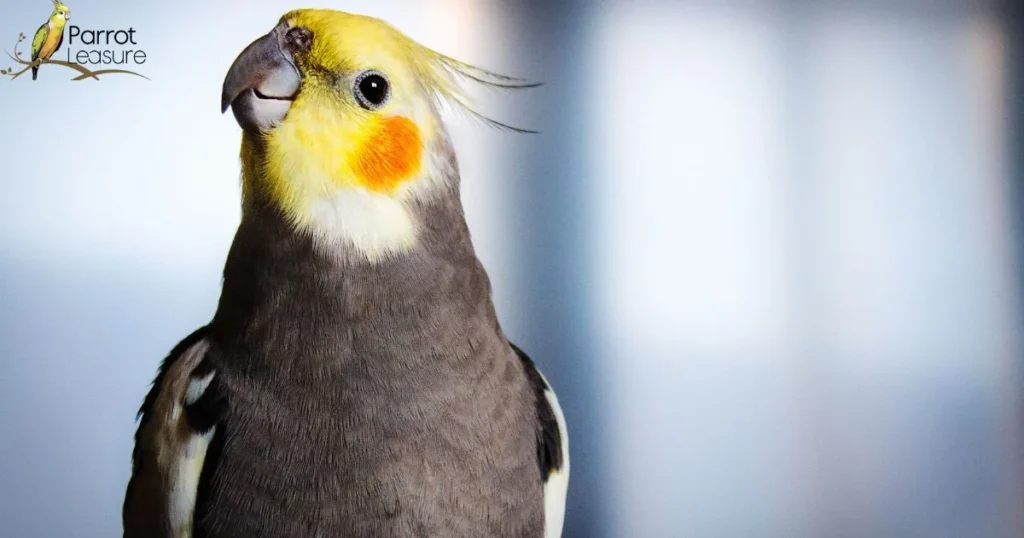
Cockatiels should not eat peanut butter due to its sticky texture and potential choking hazard. Instead, offer them a variety of fruits, vegetables, and seeds that are safe and nutritious. Fresh foods like bananas, apples, carrots, and broccoli can be part of their balanced diet. Always ensure the food is properly washed and cut into small, manageable pieces for your cockatiel.
For a protein-rich alternative to peanut butter, consider offering your cockatiel nuts such as almonds, walnuts, and cashews. These should be unsalted and given in moderation to avoid excessive fat intake. Remember to provide fresh water daily and clean their food bowls regularly to maintain good health and hygiene for your feathered friend.
Preparing Peanut Butter Treats For Cockatiels
When preparing peanut butter treats for cockatiels, use only natural, unsalted peanut butter in very small quantities. It’s important to avoid processed peanut butter, as it often contains additives that are harmful to birds. Ensure the peanut butter is thoroughly stirred to mix separated oils and is free of any added salt or sweeteners.
Offer the peanut butter sparingly to prevent obesity and excessive thirst in your cockatiel. You can spread a tiny amount on a piece of fruit or vegetable as a special treat. Always monitor your cockatiel’s reaction to new foods and provide plenty of fresh water. Remember, peanut butter should only be an occasional treat, not a regular part of their diet.
Understanding Cockatiels’ Allergic Reactions to Peanut Butter
Cockatiels may have allergic reactions to peanut butter, presenting symptoms like itching, rash, and difficulty breathing. It’s crucial to consult a vet before introducing peanut butter to your bird’s diet. Allergies can also lead to more severe reactions, including anaphylactic shock, which is a medical emergency.
Always observe your cockatiel closely after offering new foods and seek veterinary care if you notice any adverse reactions. Peanut butter’s high fat content can cause digestive issues in cockatiels, as they lack the enzymes to properly digest such fats. Over Consumption may lead to obesity, liver disease, and feather problems.
To ensure your cockatiel’s health, provide a balanced diet and avoid high-fat foods like peanut butter. If you choose to feed peanut butter, do so in minimal amounts and watch for any signs of discomfort or illness.
Expert Opinions on Cockatiels and Peanut Butter
Experts suggest that natural, unsalted peanut butter can be given to cockatiels in very small amounts as an occasional treat. It’s essential to avoid processed peanut butter, which often contains harmful additives. Pure peanut butter is high in calories and fats, making it a poor dietary choice for cockatiels and should be offered sparingly to prevent obesity.
While peanut butter isn’t toxic for cockatiels, it’s not a regular dietary item for them. Some experts recommend offering it no more than twice a week to avoid health issues. Always ensure the peanut butter is free of xylitol and other sweeteners, as their effects on birds are uncertain. A balanced diet for cockatiels should include a variety of foods to meet their nutritional needs.
Organic peanut butter For your Cockatiels
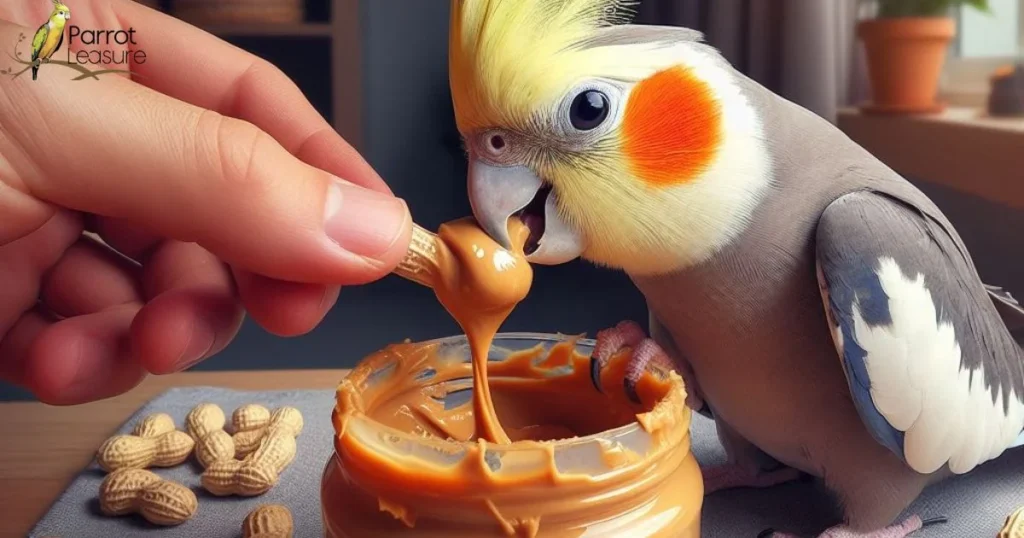
Organic peanut butter is safe for cockatiels when given as a rare treat and in tiny amounts. It should be pure, without additives, emulsifiers, or sweeteners that could harm your bird. Although not toxic, organic peanut butter is high in calories and fats, which are not ideal for a cockatiel’s diet.
Offer it sparingly to avoid health issues like obesity and ensure it’s free from wood sugar and other harmful substances. When choosing organic peanut butter for cockatiels, opt for brands with only peanuts, salt, and sugar.
Avoid processed varieties, as they often contain unhealthy additives. If possible, make your own peanut butter at home to control the ingredients. Always provide plenty of fresh water, as peanut butter can cause excessive thirst in cockatiels.
FAQ’s
Is human peanut butter safe for birds?
Peanut butter intended for human consumption contains up to 100 times more salt than our specialist blend and should not be fed to garden birds or wildlife.
Is peanut butter toxic to parrots?
Yes, but only organic or pure peanut butter. Some brands of peanut butter add sugar and preservatives to extend the shelf life, and these things are toxic to parrots.
Is honey OK for birds?
This natural sugar may seem like a great treat for birds, but it can be fatal. Honey can carry harmful bacteria, like fungus, mold, E. coli and listeria.
What are Cockatiels’ favorite food?
Cockatiels enjoy a range of foods, including commercial birdseed, pelleted food, vegetables, fruit and the occasional treat. A mixture of 75% pellets and 25% seeds will be the mainstay of your cockatiel’s diet.
Final Thoughts
It’s essential to prioritize the health of cockatiels by choosing their food wisely. Peanut butter is not recommended for these birds due to potential health risks. Instead, focus on providing a balanced diet that supports their well-being.
For cockatiel owners, understanding what foods are safe is crucial. By avoiding peanut butter and opting for approved bird-safe treats, you can ensure your feathered friend remains healthy and content.


